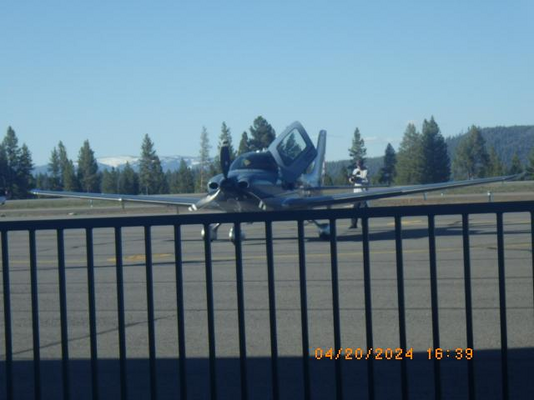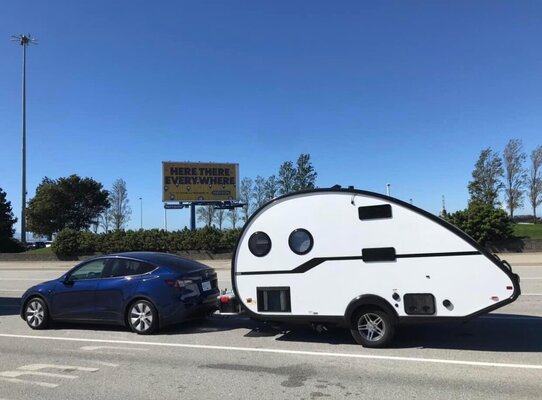Skookum
Well-known member
- Joined
- Dec 19, 2018
- Posts
- 3,758
So goes purchasing a used rental car.
What's the saying? Nothing goes faster than a borrowed car...
Good point, but then, when I rent a car, it's because I am NOT at home. I am usually on a business trip, or a short notice family trip.How many people that rent these actually have a way to charge them at home? Sure, they can take them to a charging station and site there for hours.
In Placerville the other day, I met a guy with a 2014 Tesla Model S at the Tesla Supercharging station. We BSed for a while. He says he never charges at home which I thought was weird at first.How many people that rent these actually have a way to charge them at home? Sure, they can take them to a charging station and site there for hours.
The cab companies up here tend to run 2014 to 2017 model S’s with free supercharging. Many have north of 400,000 kilometres on their original batteries. Cash machines.In Placerville the other day, I met a guy with a 2014 Tesla Model S at the Tesla Supercharging station. We BSed for a while. He says he never charges at home which I thought was weird at first.
Then he explained that model car gets free Supercharging for the life of the car. He purchased it used last year for less than 20K$ and he says it saves him around 4K$ per year in gasoline.
He only uses the superchargers, but that makes me wonder how much longer that ten-year-old battery will last. He said there has been no noticeable battery degradation so far.
At 250 KW charging, it only took a few minutes to fully charge his 60 KWH Model S battery. Far from "hours".
When new in year 2014, a new Tesla Model S costed 71K$.
-Don- Auburn, CA
At 250 KW charging, it only took a few minutes to fully charge his 60 KWH Model S battery. Far from "hours".
Regardless, people who rent cars aren't interested in EV gaslighting, they want to rent a car to get them from point A to point B. They aren't interested in renting a pita and that's exactly why they weren't being rented and why Hertz dumped them. The average ICE vehicle will burn a little above $20k in gas over a fifteen year lifespan, factor in the initial cost of an EV, charging, it's reduced resale value, higher maintence costs, intangible pita factor to include they ride like a chuckwagon, and the new $15,000 battery it will need before it reaches a 15 year lifespan and it's no contest.In Placerville the other day, I met a guy with a 2014 Tesla Model S at the Tesla Supercharging station. We BSed for a while. He says he never charges at home which I thought was weird at first.
Then he explained that model car gets free Supercharging for the life of the car. He purchased it used last year for less than 20K$ and he says it saves him around 4K$ per year in gasoline.
He only uses the superchargers, but that makes me wonder how much longer that ten-year-old battery will last. He said there has been no noticeable battery degradation so far.
At 250 KW charging, it only took a few minutes to fully charge his 60 KWH Model S battery. Far from "hours".
When new in year 2014, a new Tesla Model S costed 71K$.
-Don- Auburn, CA
^^^That^^^Good point, but then, when I rent a car, it's because I am NOT at home. I am usually on a business trip, or a short notice family trip.
In the current market, I just want a car that will get me around, and I don't want to have to provide anything more than keeping it fueled, so I can get around where I need to go. I'll worry about renting an electric car when there is no other choice.
Before two days ago, talking with the guy I met in Placerville, CA, I didn't even realize that some of the older Teslas came with free supercharging for the life of the car.The cab companies up here tend to run 2014 to 2017 model S’s with free supercharging. Many have north of 400,000 kilometres on their original batteries. Cash machines.

Perspective I guess. We went from a Jeep grand Cherokee to a Tesla model Y. There was literally nothing better about the Jeep grand Cherokee. It was more expensive to buy, more expensive to operate and more expensive to maintain. It was also not near as comfortable or convenient in winter. Not near as good as traction or handling. It was a dog for towing and had no where near the horsepower or torque. The tech was old and dated and the sound system was a joke. In the summer If we sat at a ferry terminal waiting (sometimes 4 hours) we couldn’t leave the motor on for AC because it would overheat. In the tesla we stay cool and entertained watching Netflix on the screen.Regardless, people who rent cars aren't interested in EV gaslighting, they want to rent a car to get them from point A to point B. They aren't interested in renting a pita and that's exactly why they weren't being rented and why Hertz dumped them. The average ICE vehicle will burn a little above $20k in gas over a fifteen year lifespan, factor in the initial cost of an EV, charging, it's reduced resale value, higher maintence costs, intangible pita factor to include they ride like a chuckwagon, and the new $15,000 battery it will need before it reaches a 15 year lifespan and it's no contest.
I rented a new Jeep Compass and had the same opinion of it's tech and performance. Heck, the 25 year old radio and CD player in my 1999 Ford F350 works better than the Jeep's "sound system" and the manual controls for the cabin climate control system are easier to operate and more intuitive than the Jeep's. I do have to use my phone or laptop to watch Netflix, though.Perspective I guess. We went from a Jeep grand Cherokee to a Tesla model Y. There was literally nothing better about the Jeep grand Cherokee. It was more expensive to buy, more expensive to operate and more expensive to maintain. It was also not near as comfortable or convenient in winter. Not near as good as traction or handling. It was a dog for towing and had no where near the horsepower or torque. The tech was old and dated and the sound system was a joke. In the summer If we sat at a ferry terminal waiting (sometimes 4 hours) we couldn’t leave the motor on for AC because it would overheat. In the tesla we stay cool and entertained watching Netflix on the screen.
To each his own I guess. There is an a$$ for every seat. But I would never go back to 20th century tech. Ugh.
I guess I'm out of touch, never one time have I looked over at my wife while in the car and said " I wish we could get Netflix".Perspective I guess. We went from a Jeep grand Cherokee to a Tesla model Y. There was literally nothing better about the Jeep grand Cherokee. It was more expensive to buy, more expensive to operate and more expensive to maintain. It was also not near as comfortable or convenient in winter. Not near as good as traction or handling. It was a dog for towing and had no where near the horsepower or torque. The tech was old and dated and the sound system was a joke. In the summer If we sat at a ferry terminal waiting (sometimes 4 hours) we couldn’t leave the motor on for AC because it would overheat. In the tesla we stay cool and entertained watching Netflix on the screen.
To each his own I guess. There is an a$$ for every seat. But I would never go back to 20th century tech. Ugh.
It is nice when you're waiting in line for 4 hours for one of those Canadian ferries.I guess I'm out of touch, never one time have I looked over at my wife while in the car and said " I wish we could get Netflix".
I guess I'm out of touch, never one time have I looked over at my wife while in the car and said " I wish we could get Netflix".
I hear ya. But waiting four hours for a ferry in bad weather, it’s kind of nice to have the ability to watch a movie. Or the news or whatever.I guess I'm out of touch, never one time have I looked over at my wife while in the car and said " I wish we could get Netflix".
It is nice when you're waiting in line for 4 hours for one of those Canadian ferries.

From Windows Edge Auto-reply (be sure to read the links below):High rate supercharging and full discharges are hard on the battery. As the article says, guess what usually happens to a rental car.
I was just thinking about that. I assume most of the charging done with rented EVs is done right there at the rental place, with 12 KW max. IOW, a slow AC charger like I have at each of my houses.High rate supercharging and full discharges are hard on the battery. As the article says, guess what usually happens to a rental car.
" Why EV's could not be, maybe, perhaps, sometimes, don't seem to be, studies might indicate, otherwise, who really knows, likely to be, but" published by Gaslight Press.From Windows Edge Auto-reply (be sure to read the links below):
Supercharging your Tesla frequently was once thought to accelerate battery degradation, but recent studies suggest otherwise. According to a study by Recurrent, there’s little to no difference in battery degradation between Teslas that fast charge more than 90% of the time and those that fast charge less than 10% of the time.
However, Tesla’s owner manual does mention that the peak charging rate of the battery may decrease slightly after a large number of DC Fast Charging sessions, such as those at Superchargers. Also, fast charging under extreme heat or extreme cold is not ideal for battery performance.
So, while frequent supercharging doesn’t seem to significantly affect the overall longevity of a Tesla’s battery, it’s still recommended to use Superchargers judiciously. It’s also important to note that every battery will degrade over time, regardless of how it’s charged. For instance, Tesla states that its vehicles lose only about 12% of their battery capacity after 200,000 miles.
Remember, the health and lifespan of EV batteries are continually improving, and the impact of supercharging on battery life is likely to be minimal. However, it’s always a good idea to follow the manufacturer’s guidelines for charging and maintaining your vehicle’s battery to ensure its longevity.
